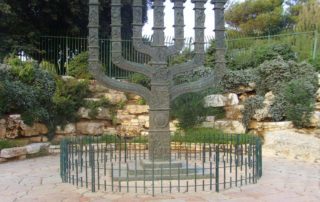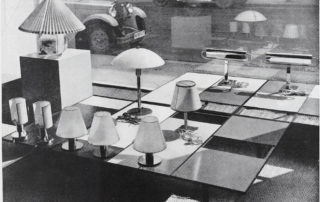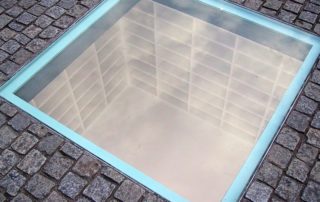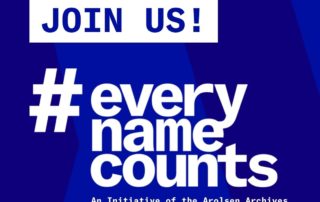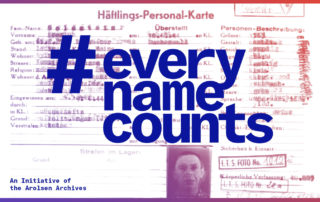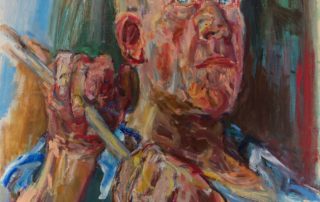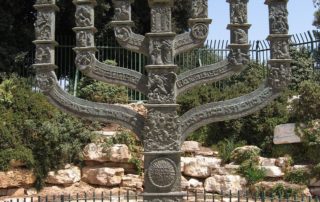Rachel Stern2023-04-26T13:54:56-04:00April 19th, 2023|Events, Lectures, Past Events|
In honor of Yom Ha'azmaut, Israel's Independence Day, and this year's 75th anniversary of the establishment of the modern state of Israel in 1948, this talk by Georgetown University professor Ori Z Soltes addresses the question of what defines Israeli art and when it began to take shape. Is it made only by Israelis---then how did Elkan's Menorah become the consummate symbol of Israel when he never lived in the state? Did "Israeli" art begin with or before the birth of the state? How does this relate to the opening of the Bezalel School of Art in 1906--and closing by 1929, only to re-open years later? How does it relate to the question of defining Jewish art? Benno Elkan's stunning work, [...]
Rachel Stern2023-05-03T14:36:21-04:00March 28th, 2023|Events, Lectures, Past Events|
Histories of Germany’s Bauhaus art and design school (1919–33) usually position it exclusively as a movement in exile as soon as the Nazis took power in 1933. In fact, the vast majority of its members remained and embraced Nazism, survived it, or became its victims. In this talk, art historian Elizabeth Otto scrutinizes traces of the work and lives of Bauhäusler who, through their imprisonment and often deaths in the concentration-camp system, have largely been lost to the history of the Bauhaus movement. Using archival sources—often scant materials preserved by family members and friends, including documents, photographs, and private memoirs—she reconstructs aspects of these artists’ work and lives and considers how to write the histories that Nazi violence has taken [...]
Rachel Stern2023-04-17T19:19:05-04:00March 6th, 2023|Events, Lectures, Past Events|
In honor of Yom HaShoah, this talk by Georgetown University professor Ori Z Soltes focuses on three Israeli and three American familiar and unfamiliar artists working in very diverse styles and not typically thought of as focusing on the Holocaust. Each of them, however, has offered powerful reflections on the defining catastrophe of the twentieth century. Barnett Newman, the foremost verbal spokesman for the chromatic side of the abstract expressionist movement redefining American painting in the early 1950s, offers an unexpectedly intense reflection on the question of theodicy. Mordecai Ardon, in the process of assuming leadership of the Bezalel school in Jerusalem at around the same time, balances between abstraction and figuration in depicting the Nazi-engendered chaos. Yigal Tumarkin’s [...]
Rachel Stern2022-02-18T06:38:48-05:00January 20th, 2022|Events, Lectures, Past Events|
Become part of an international community that actively helps build the largest digital memorial to the victims of National Socialism. During this 48 hour challenge, we help the Arolsen Archives index documents from the Central Location Index (CLI) at Yad Vashem, which have never been indexed before. Every number, every place, and every name you type in on the crowdsourcing platform will help preserve the memory of the persecutees – and make sure we never forget what happened to them. This event features Elizabeth Berkowitz, our former Digital Interpretation Manager, who speaks about #everynamecounts at the Fritz Ascher Society, and Katharina Menschick from the Arolsen Archives, who introduces the Arolsen Archives and the current project. A [...]
Rachel Stern2022-02-18T06:42:00-05:00May 11th, 2021|Events, Past Events|
Join the Fort Tryon Jewish Center (FTJC) and the Fritz Ascher Society for a LIVE DATA ENTRY EVENT to help build the world’s largest digital monument to victims of the Holocaust: the Arolsen Archives’ #everynamecounts. THIS EVENT WAS NOT RECORDED. Opening Remarks Rabbi Guy Austrian Fort Tryon Jewish Center in New York Rachel Stern Director and CEO of the Fritz Ascher Society in New York Introduction and Moderation Elizabeth Berkowitz Digital Interpretation Manager of the Fritz Ascher Society in New York #everynamecounts is a crowd-sourced data entry initiative to return the names of Holocaust victims, their families, and details of their lives into the findable, keyword-searchable public record. Participants enter information about Nazi victims and family members from digitized [...]
Rachel Stern2022-02-18T06:37:23-05:00March 4th, 2021|Events, Past Events|
The International Tracing Service (ITS), since 2019 called Arolsen Archives, was established by the Allies in 1948 as a central search and information center. They house the world’s most extensive collection of documents about the victims of National Socialist persecution, including documents from Nazi concentration camps, ghettoes and penal institutions, documents about forced laborers, and documents from the early post-war period about Displaced Persons, mainly Holocaust survivors, former concentration camp prisoners, and forced laborers. People who had fled the sphere of influence of the Soviet Union for political reasons are also included. The archive's holdings consist of 30 million documents in total and belong to UNESCO’s Memory of the World. At this event, Floriane Azoulay (Director) and Giora Zwilling (Deputy [...]
Rachel Stern2022-02-18T06:04:58-05:00March 3rd, 2021|Events, Lectures, Past Events|
The Austrian artist Oskar Kokoschka (1886-1980) achieved world fame with his intense expressionistic portraits and landscapes. Rüdiger Görner, author of the first English-language biography, depicts the artist in all his fascinating and contradictory complexity. He traces Kokoschka’s path from bête noire of the bourgeoisie and a so-called ‘hunger artist’ to a wealthy and cosmopolitan political and critical artist who played a major role in shaping the European art scene of the twentieth century and whose relevance is undiminished to this day. In 1934, Kokoschka left Austria for Prague, and in 1938, when the Czechs began to mobilize for the expected invasion by the German Wehrmacht, Kokoschka fled to the United Kingdom, where he remained during the war. Although he [...]
Rachel Stern2022-02-18T07:06:06-05:00February 22nd, 2021|Events, Lectures, Past Events|
Born 1877 in Dortmund, the sculptor Benno Elkan (1877-1960) first studied painting in Munich and Karlsruhe. At the end of his studies, he turned to sculpture. As a young artist, he spent time in Paris, Rome, and Frankfurt. Elkan’s oeuvre was largely made up of commissions. In the beginning, he mainly created tombs. Medals, portrait busts of well-known personalities, monuments to victims and candelabras follow, partly for the religious (Jewish and Christian) context. Elkan fled persecution by the German Nazi regime to Great Britain in 1934and lived with his family in London until the end of his life. Perhaps the most important work besides the Menorah in Jerusalem (1956) was never built: Memorial to the Defenseless Victims of the Bombing [...]


